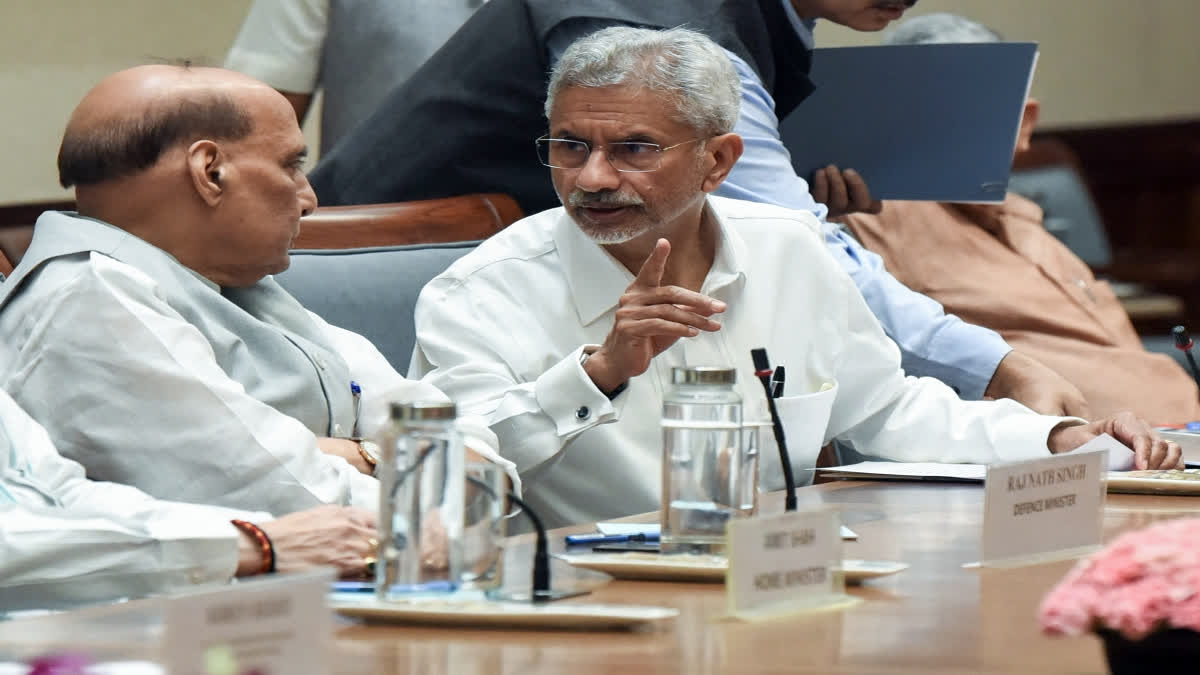New Delhi: Union External Affairs Minister (EAM) S Jaishankar on Tuesday said on August 5 former Bangladesh Prime Minister Sheikh Hasina made a request for approval to come to India "for the moment".
Making a suo-moto statement in the Rajya Sabha, the EAM said, "India-Bangladesh relations have been exceptionally close for many decades over many governments. Concern about recent violence and instability there is shared across the political spectrum."
Suo-moto statement in Rajyasabha on the situation in Bangladesh. https://t.co/ceM41AEATE
— Dr. S. Jaishankar (@DrSJaishankar) August 6, 2024
"Since the election in January 2024, there has been considerable tension, deep divides, and growing polarisation in Bangladesh politics. This underlined foundation aggravated a student agitation, that started in June this year. There was growing violence including attacks on public buildings and infrastructure as well as traffic and rail obstruction. The violence continued through the month of July," added Jaishankar.
"Throughout this period we counselled restrain and urged the situation be diffused through dialogue. Similar urgings were made to various political forces with whom we were in touch. Despite the Supreme Court judgement on 21st July, there was no let up in the public agitation. Various decisions and actions taken thereafter only exaggerated the situation. The agitation at this stage, is more or less around a one-point agenda, that is the Prime Minister Sheikh Hasina should step down," said the External Affairs Minister.
"On 4th August, events took a serious turn, attacks on the police including police stations and government installations intensified even as the overall level of violence greatly escalated. Properties of individuals associated with the regime were torched across the country. What was particularly worrying, was that minorities, their businesses, and temples, also came under attack at multiple locations. The full extent of it is still not clear," he added.
"On 5th August, demonstrators converged in Dhaka, despite the curfew, our understanding is that after a meeting with leaders of the security establishment, Prime Minister Sheikh Hasina apparently made the decision to resign. At very short notice, she requested approval to come for the moment to India," he said.
"We simultaneously received the request for flight clearance from Bangladesh authorities. She arrived yesterday evening in Delhi. The situation in Bangladesh is still evolving. The Army chief General Waker-Uz-Zaman addressed the nation on 5th August. He spoke about assuming responsibility and constituting an interim government. We are in close and continuous touch with the Indian community in Bangladesh through our diplomatic missions, there are an estimated 19,000 Indian nationals there, of which about 9,000 are students. The bulk of the students have however returned to India in the month of July," he added.
Meanwhile, India has reached out to the military leadership headed by Army chief Waker-Us-Zaman in Bangladesh and urged for early restoration of peace, law and order and normalcy in the country.
According to sources, the government has already reached out to the Bangladesh Army chief and extended all kinds of support for normalcy to return to the country after the ouster of former Bangladesh premier Sheikh Hasina. Earlier today, S Jaishankar told an all-party meeting in New Delhi that India has assured help to former Bangladesh Prime Minister Sheikh Hasina, who arrived in New Delhi Monday evening, and given her time to decide the future course of action, sources said.
Briefing political party leaders in Parliament House, Jaishankar said India was in touch with the Bangladesh Army to ensure the safety of Indian students in that country, the sources said.
In response to a question concerning the possible involvement of a foreign hand in the Bangladesh situation, Jaishankar said that all possible angles were being looked into. Further, Jaishankar assured that the Indian government is in constant communication with Indian nationals and that the High Commission in Bangladesh continues to operate.
The leaders were also informed that the safety of minorities is a priority and that measures are being taken to protect them, according to sources. Meanwhile, Jaishankar appreciated the unanimous support and understanding extended by all parties.
In a post on X, he said, "Briefed an All-Party meeting in Parliament today about the ongoing developments in Bangladesh. Appreciate the unanimous support and understanding that was extended".
The meeting was attended by Union Ministers Amit Shah, Rajnath Singh, J P Nadda, Kiren Rijiju, Leader of the Opposition Rahul Gandhi, Congress President Mallikarjun Kharge and MP K C Venugopal.
Bangladesh has been witnessing massive protests and violence that began last month after student groups demanded the scrapping of a controversial quota system in government jobs. That escalated into a campaign to seek the ouster of Hasina.
India-Bangladesh ties
India and Bangladesh share a multifaceted and dynamic relationship rooted in historical, cultural, and geographical ties. India played a crucial role in Bangladesh's War of Independence in 1971, providing military support that helped Bangladesh gain independence from Pakistan.
In terms of economic cooperation, India is one of Bangladesh's largest trading partners. Bilateral trade has grown significantly, with both countries benefiting from tariff concessions and duty-free access under various agreements.



